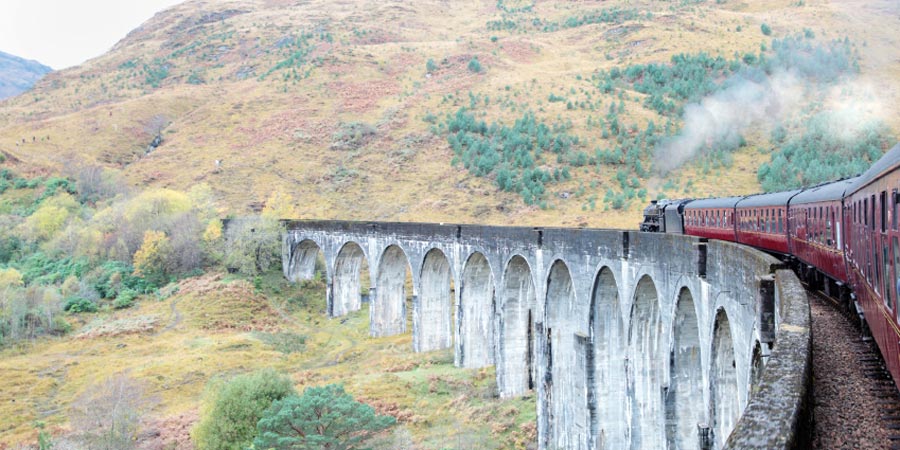Literature and rail travel have always been intrinsically linked
in some manner or other.
A good book has alleviated even the most mundane rail journey,
countless plays have been performed against a railway set, and a
plethora of poems have been composed about the motion and class of
rail travel. Tales of drama and romance occupy every compartment,
scenes of intrigue and espionage recline in elegant dining cars,
and daring raids and train robberies are carried out in the
driver's cabin. Declarations of love are hurled out in anguish on
station platforms, chase scenes take place atop carriage roofs and
desperate fights take place on abandoned rail tracks.
From their conception in the early 19th century to the
modern day and into the future, railways have seeped into every
facet of literature and in this blog, we explore some of the best
examples.
The Railway Children
Beloved by every child and his/her dog, this beautifully told
tale set in Yorkshire at the start of the 20th century
is an absolute delight. A love letter to the heady days of summer,
drenched in a nostalgia that most of us recognise but will never
experience, the Railway Children follows the adventures of a family
as they get involved in various escapades. The central story
surrounds the father of the children who is falsely imprisoned on
espionage charges, and who eventually is freed with the help of the
children and an elderly gentleman who boards the 9:15 train each
day. Giving wonderful snapshots of an untouched rural Britain as a
backdrop to several charming stories, the railway children remains
as one of the greatest British children's book ever written.
The Ghost Train
The first entry on our list which could be considered close to
the horror genre is this intriguing comedy/suspense play from the
mind and pen of notable English playwright Arnold Ridley (famous as
Private Godfrey from Dad's Army). The Ghost Train focuses on the
story of railway travellers who become stranded overnight at a
railway station and are warned of a ghost train which travels the
track bringing death to those who set their eyes on it. What
develops from there is an enthralling plot featuring spies, a
gunfight and mystery, with much of the action based around the
overshadowing tension that the possibility of the ghost train
appearing represents. The play was later made into a film directed
by Walter Forde and starring Arthur Askey.
From a Railway Carriage
Robert Louis Stephenson, famous for his horror and adventure stories like The Strange Case of Dr Jekyll and Mr Hyde and Treasure Island, penned this poem which portrays the sights seen from a moving railway carriage. Everything about this piece breathes breathless railway movement, the verses chunter onwards like the pumping wheels of a locomotive and glances of the Great British countryside blurring into a rolling tapestry of idyllic country living; 'Each a glimpse and gone for ever!'. A personal favourite line is 'And ever again, in the wink of an eye, Painted stations whistle by.'
Strangers on a Train
The master and godmother of psychological thrillers and the
'poet of apprehension' Patricia Highsmith works wonders with this
truly excellent novel about two men who meet on a train and discuss
trading murders. Successful architect Guy Haines meets the
eccentric Charles Bruno on a train, who suggests that Haines murder
Bruno's father and that Bruno in turn, kills Haines' unfaithful
wife thus leading to a suspectless murder. What follows is a
complex, cloying and suspenseful novel filled with turns and
tangles, and the slow unravelling of both men's lives. Highsmith's
first book, Strangers on a Train was adapted for a 1951 film by
Alfred Hitchcock and for countless plays across the world.
Night Mail
Atmospheric and ethereal, dusky and serene, W H Auden's Night Mail delves deep into the night and conjures some beautiful imagery of a mail train rumbling through the British early morning as it heads up into the Scottish dusk. Like From a Railway Carriage, Night Mail is onomatopoeic in its stanzas, taking rhythmic cues from the chuntering of a railway track. For such a seemingly simple poem, this work covers a fair few themes including loneliness, communication and nature, drawing from each one the tranquillity of the night. It ends with a wonderfully pensive line: 'For who can bear to feel himself forgotten?'.
Murder on the Orient Express
Intense and grandiose in its paranoid intrigue, Agatha
Christie's most famous work perfectly combines the mystery, romance
and elegance of railway travel with this detective thriller. Iconic
detective Poirot with his moustache intact becomes stranded with a
colourful cast of characters on the Simplon-Orient Express, a
situation which swiftly turns dark with the murder of a passenger.
Inspired by her journeys across Europe by rail, Christie
masterfully weaves this story amidst the stunning backdrop of snowy
Croatia and from within the illustrious carriages of the famous
train itself.
Those are just some iconic works of literature featuring railways
and rail travel. If we've missed any in the list above, sound off
in the comments below!






